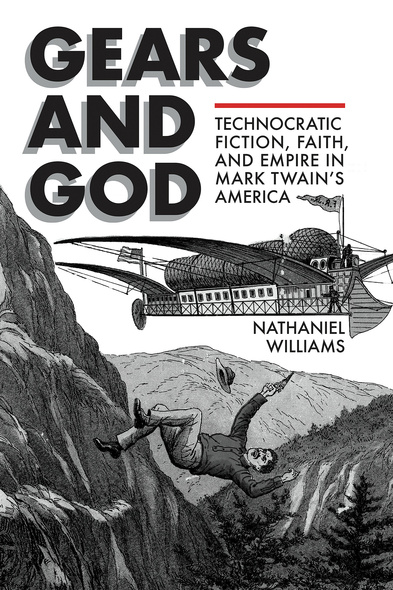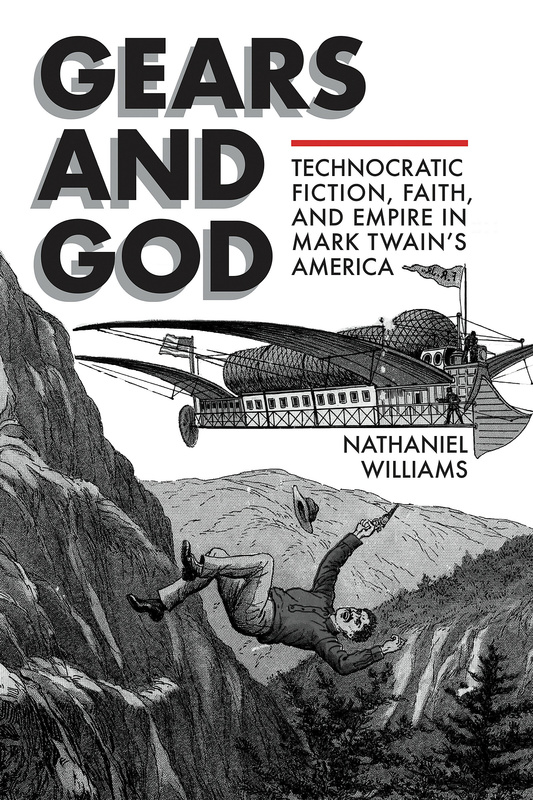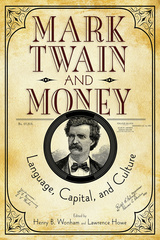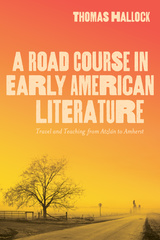
224 pages, 6 x 9
5 B&W figures - 2 maps - 3 tables
Hardcover
Release Date:31 Jul 2018
ISBN:9780817319847
Gears and God
Technocratic Fiction, Faith, and Empire in Mark Twain's America
University of Alabama Press
A revealing study of the connections between nineteenth-century technological fiction and American religious faith.
In Gears and God: Technocratic Fiction, Faith, and Empire in Mark Twain’s America, Nathaniel Williams analyzes the genre of technology-themed exploration novels—dime novel adventure stories featuring steam-powered and electrified robots, airships, and submersibles. This genre proliferated during the same cultural moment when evolutionary science was dismantling Americans’ prevailing, biblically based understanding of human history.
While their heyday occurred in the late 1800s, technocratic adventure novels like Twain’s A Connecticut Yankee in King Arthur’s Court inspired later fiction about science and technology. Similar to the science fiction plotlines of writers like Jules Verne and H. Rider Haggard, and anticipating the adventures of Tom Swift some decades later, these novels feature Americans using technology to visit and seize control of remote locales, a trait that has led many scholars to view them primarily as protoimperialist narratives. Their legacy, however, is more complicated. As they grew in popularity, such works became as concerned with the preservation of a fraught Anglo-Protestant American identity as they were with spreading that identity across the globe.
Many of these novels frequently assert the Bible’s authority as a historical source. Collectively, such stories popularized the notion that technology and travel might essentially “prove” the Bible’s veracity—a message that continues to be deployed in contemporary debates over intelligent design, the teaching of evolution in public schools, and in reality TV shows that seek historical evidence for biblical events. Williams argues that these fictions performed significant cultural work, and he consolidates evidence from the novels themselves, as well as news articles, sermons, and other sources of the era, outlining and mapping the development of technocratic fiction.
In Gears and God: Technocratic Fiction, Faith, and Empire in Mark Twain’s America, Nathaniel Williams analyzes the genre of technology-themed exploration novels—dime novel adventure stories featuring steam-powered and electrified robots, airships, and submersibles. This genre proliferated during the same cultural moment when evolutionary science was dismantling Americans’ prevailing, biblically based understanding of human history.
While their heyday occurred in the late 1800s, technocratic adventure novels like Twain’s A Connecticut Yankee in King Arthur’s Court inspired later fiction about science and technology. Similar to the science fiction plotlines of writers like Jules Verne and H. Rider Haggard, and anticipating the adventures of Tom Swift some decades later, these novels feature Americans using technology to visit and seize control of remote locales, a trait that has led many scholars to view them primarily as protoimperialist narratives. Their legacy, however, is more complicated. As they grew in popularity, such works became as concerned with the preservation of a fraught Anglo-Protestant American identity as they were with spreading that identity across the globe.
Many of these novels frequently assert the Bible’s authority as a historical source. Collectively, such stories popularized the notion that technology and travel might essentially “prove” the Bible’s veracity—a message that continues to be deployed in contemporary debates over intelligent design, the teaching of evolution in public schools, and in reality TV shows that seek historical evidence for biblical events. Williams argues that these fictions performed significant cultural work, and he consolidates evidence from the novels themselves, as well as news articles, sermons, and other sources of the era, outlining and mapping the development of technocratic fiction.
Given the ongoing political disaster being wrought in the United States by the currently dominant alliance of white racism, Christian fundamentalism, and military-industrial cronyism, Williams’s meticulous analysis of the technocratic exploration narrative’s contradictory mix of high-tech violence and pre-Enlightenment cosmology is both timely and bracing. It is highly recommended for scholars of early science fiction, as well as for those wondering about the historical breeding ground for the US’s contemporary cultural and political morass.'
—Science Fiction Studies
‘Scholars of literature and religion, religion in the long nineteenth century, posthumanism, and science and technology studies will be well rewarded in reading Gears and Gods.’
—Religious Studies Review
'Gears and God is a clearly written, persuasive book which brings fresh insights to bear on the rich literature of dime novels, science fiction, and technocratic exploration narratives at the turn of the twentieth century.'
—Gregory M. Pfitzer, author of History Repeating Itself: The Republican Phenomenon in Children's Historical Literatureand the Christian Right and Popular History and the Literary Marketplace, 1840–1920
Williams’ book includes extensive notes, bibliography, and index, more than sufficient for the reader who desires a thorough grounding in what the reader will undoubtedly conclude is a vibrant form of American literature whose neglect is, putting it mildly, undeserved. Williams has certainly succeeded in blurring the distinction between serious and recreational literature in Gears and God.’
—American Literary Realism
‘Scholars of many different fields—including children’s literature, nineteenth-century American literature, early sf, and others—will find Gears and God to be a valuable book. Moreover, many of the issues first raised by these novels over a century ago, such as imperialism or the mistaken belief that scientific advancement always signifies social progress, are still very much with us today. This study serves as a valuable reminder of the complexity and cultural significance that can exist in forgotten and overlooked works of literature.’
—Extrapolation
Nathaniel Williams is a lecturer for the University Writing Program at the University of California, Davis, and serves on the advisory board for the Gunn Center for the Study of Science Fiction. He has published articles in American Literature, Utopian Studies, Nineteenth-Century Contexts, and elsewhere.












